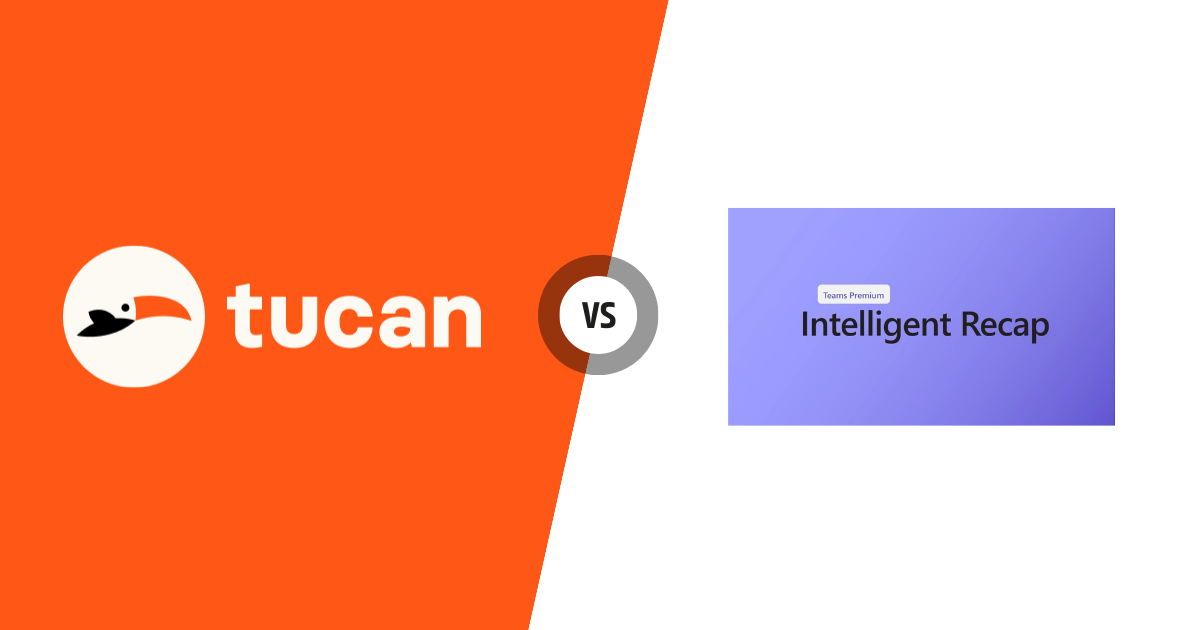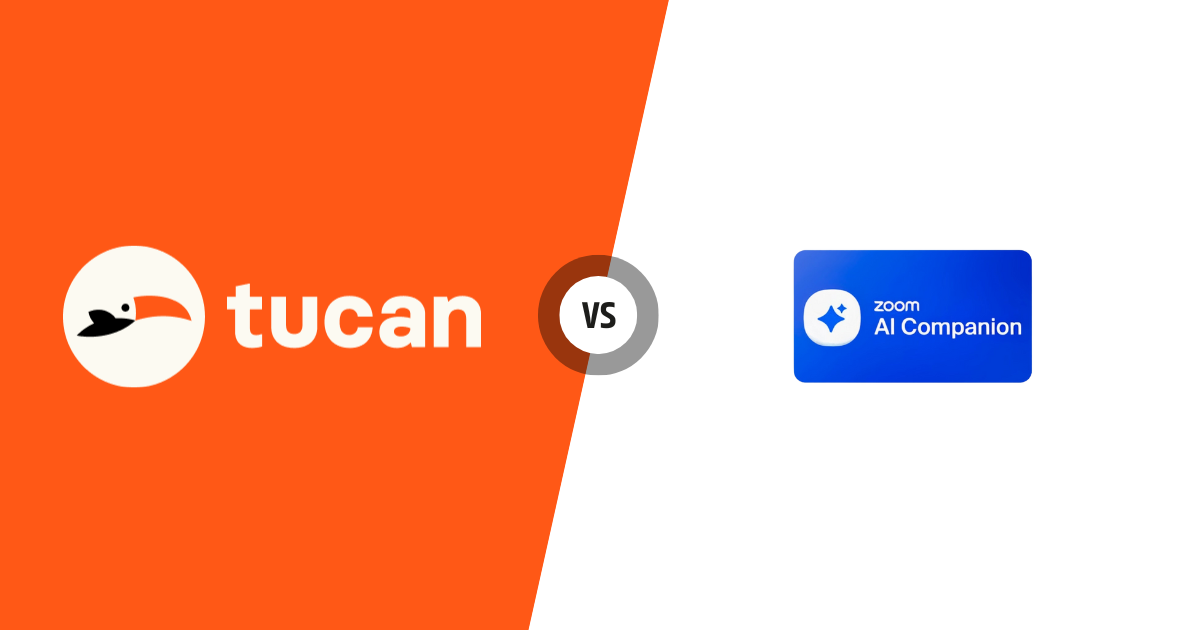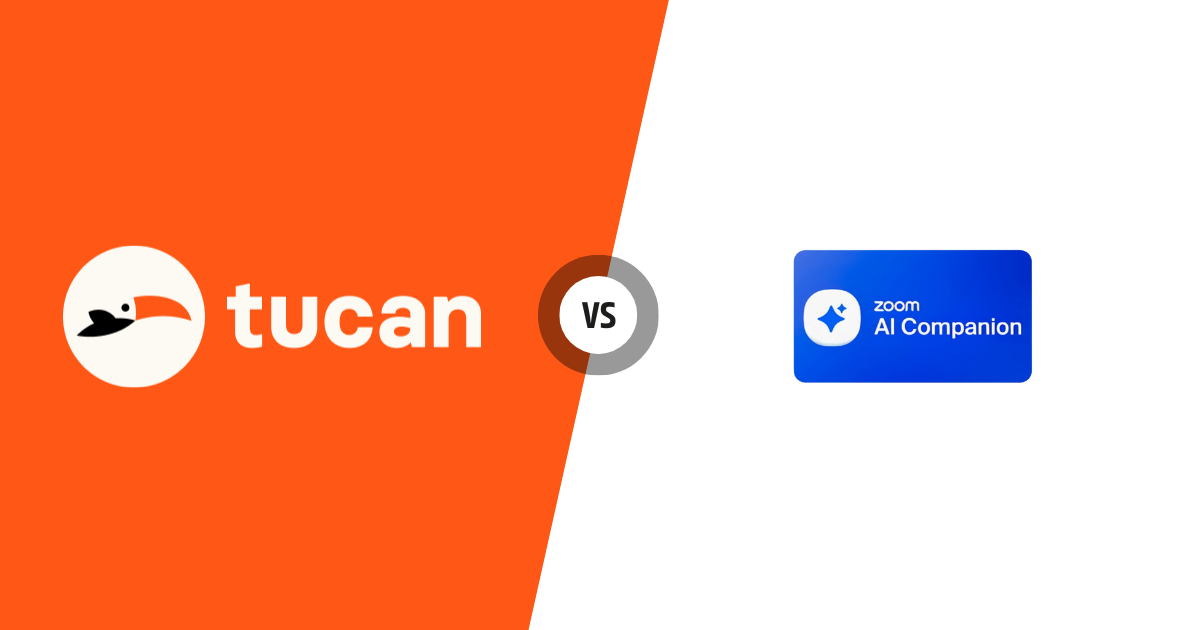The AI Divide: How European Firms Can Harness Their Regulatory Strengths and Learn from US Innovation
Table of contents
European Companies' Headstart
Regulatory Alignment and Ethics
At the heart of European innovation is a rigorously defined regulatory framework highlighted by the General Data Protection Regulation (GDPR) and the anticipated EU AI Act. These regulations have initiated an era of heightened ethical awareness, where considerations around bias and fairness are not just afterthoughts but foundational components of AI strategies. This compliance-focused approach means European companies are not only generating AI solutions that respect individual rights but also pioneering models that could set global benchmarks.
As conversations around AI ethics become more prevalent, Europe’s early emphasis on these concerns places it in a thought leadership position capable of steering international policy making. A stringent regulatory environment also forces European businesses to be inventive within constraints, potentially driving more robust and universally acceptable AI solutions.
Governance and Board Involvement
The governance of AI in Europe is not left to IT departments alone; it has become a matter for boardrooms. With top-tier executives often at the helm of AI initiatives, tech adoption is closely wedded to the broader business strategy and operational objectives. This level of executive involvement ensures that AI investments are more than just experimental; they are strategic, mission-critical decisions tied to long-term visions.
By leveraging high-level oversight, European companies can better anticipate future challenges and strategically leverage AI to meet them. This approach significantly reduces the risk of misaligned tech ventures and ensures AI efforts are commensurate with the company’s trajectory and stakeholders' expectations.
Confidence in Data and AI Control
European firms exude confidence in their ability to manage and control AI systems, a direct outcome of adhering to strict data governance standards. This is a critical advantage in a world where data is not only ubiquitous but also a prime target for misuse. The assurance of data integrity and controlled AI application instills trust amongst consumers and stakeholders alike, positioning European companies as dependable and responsible technology providers.
As AI becomes more deeply integrated into every aspect of business operations, this inherent trust will become invaluable. It grants a level of user assurance that is often lacking in less-regulated markets and ensures European AI solutions meet the highest standards of data quality and security.
Learning Opportunities from US Companies
Speed of Adoption and Experimentation
American corporations have taken the lead in the practical implementation of AI, with a key focus on speed and agility. US businesses tend to experiment extensively, rapidly prototyping and iterating to discover valuable and innovative use cases. This willingness to adopt and adapt quickly enables American firms to stay ahead of the technological curve.
European companies could benefit by injecting this same level of dynamism into their AI strategies. While being mindful of ethical considerations and regulatory frameworks, there is room for more immediacy in the deployment and trial of emerging AI tech. Doing so could shorten the innovation cycle and help European businesses not only stay competitive but also become trendsetters in the global market.
Realizing Business Value
The practical impact of generative AI on a company's bottom line is unmistakable in the case of US firms, where a higher percentage already report tangible business benefits from their AI pursuits. This direct correlation between AI deployment and enterprise value is a blueprint for European companies, highlighting the importance of deploying AI not just for the sake of innovation but for clear-cut business enhancement.
To optimize their AI-related return on investment, European businesses should look closely at American strategies—namely, the integration of AI into core business processes from the outset. This ensures that AI initiatives are not just technologically advanced but also acutely business-oriented, ultimately contributing to overall enterprise growth.
External Partnerships for Skills
In contrast to Europe’s emphasis on cultivating in-house AI talent, American companies often turn to external partnerships to accelerate their AI proficiency. This collaborative approach can bring complementary skills to the table quickly, adding to the company's arsenal without the long lead times associated with internal training and recruitment.
European firms could embrace this external resourcefulness, broadening their AI capabilities rapidly without diluting their commitment to internal development. This hybrid model of sourcing AI skills can be the catalyst for accelerated innovation and more robust ecosystem partnerships.
Investment and Resource Allocation
Finally, the levels of investment that US companies funnel into AI far exceed those in Europe, showing a more aggressive stance towards capturing industry leadership in AI. European companies can take a leaf from the American book on strategic investment and resource allocation, putting more financial weight behind their AI ambitions.
By learning from the American approach of prioritizing AI investment, European businesses could more confidently venture into new market opportunities, investing not just capital but also a strategic vision into their AI endeavors. This intensification of resources would catalyze innovation and solidify a competitive stance on the world stage.
Charting a Balanced Future: The Convergence of European Ethics and American Agility in AI Leadership
While European businesses naturally lean towards a compliance-oriented, ethically grounded, and governance-focused AI strategy, adopting some of the bolder, more agile traits of the US approach could invigorate their AI practices. By marrying the European penchant for ethical AI with the American zest for rapid innovation and adoption, European companies could unlock unprecedented AI value and global influence. As the digital world continues to evolve, those firms that learn to effectively blend these contrasting paradigms of AI development will emerge as the true leaders in the artificial intelligence age.
Disclaimer: This blog article is grounded on insights and data from the "Generative AI Radar 2023 Europe" by Infosys. The referenced report provides a comprehensive analysis of the state of generative AI adoption among European companies, contrasting it with developments in North America. By interpreting and extending the findings of the Infosys study, this article explores the unique positions and opportunities European firms face within the burgeoning AI industry. For a thorough understanding of the original research, readers are encouraged to consult the complete Infosys Generative AI Radar 2023 Europe report.
Looking for an enterprise solution?
Whether custom data model training, custom workflow integrations, cloud or on-premise, or advanced security features, anything is possible with Tucan.ai. Tailor your package to your needs together with your personal Tucan.ai advisor.
Book a free consultation call!
MAXQDA vs. Tucan.ai: An analytical in-depth look at modern market research tools
Table of contents
MAXQDA - An established name in data analysis
MAXQDA is regarded as a robust market research software that offers both qualitative and quantitative researchers a structured analysis environment. Its powerful features for transcribing interviews and automatically transcribing audio and video files make it a preferred tool for in-depth data analysis. With synchronized time stamps and a versatile coding system, MAXQDA is particularly suitable for qualitative coding and in-depth data analysis using text and word frequency searches.
Tucan.ai - The AI-powered innovation in market research
In contrast to MAXQDA, Tucan.ai is characterized by its focus on AI-supported efficiency enhancement. The tool, specially developed for the qualitative and quantitative market research, automates and simplifies the coding of free text responses. With features for analysis based on interview guidelines and the automation of study reports, Tucan.ai offers a unique combination of efficiency and precision for market research companies.
Comparison of functions: MAXQDA AI Assist VS Tucan.ai
The technical features and functions of an analysis tool are decisive factors for its effectiveness. A direct comparison of the functions of MAXQDA and Tucan.ai clearly shows the advantages and limitations of both applications.
Overview
| Feature | ||
|---|---|---|
| Transcription Capabilities | High-precision AI-driven automatic transcription and analysis | Manual and AI-assisted transcription with AI Assist Add-on |
| AI-Assisted Analysis | Comprehensive AI features without additional purchases | Limited AI functionalities – requires add-on purchase |
| Coding and Analysis | Fully automated coding, reducing manual workload significantly | Advanced qualitative and quantitative coding tools; Manual effort required |
| Data Security and Compliance | Guarantees data localization with cloud or on-premise setup; data processing location: Germany | Data security depends on third-party service (OpenAI) for AI features |
| Language Support | Supports multiple languages, beneficial for international users | Supports multiple languages, beneficial for international users |
Status: November 2023
Book a free consultation call!
Automatic transcription & AI-based analysis of qualitative interviews
MAXQDA and Tucan.ai each offer a solution for the transcription and analysis of qualitative interviews, albeit with different approaches and technologies.
MAXQDA transcription functions: MAXQDA enables manual transcription of audio and video files and offers support through the use of AI-based transcription through the AI Assist add-on. This functionality requires an active MAXQDA 24 license and is therefore linked to a paid extension. While the tool offers helpful features for transcription such as automatic speaker changes, time stamps and auto-completion, the paid nature of AI Assist presents an additional hurdle.
Tucan.ai's AI-driven solution: In contrast, Tucan.ai aims to automate the entire transcription process and promises up to 95% accuracy. In addition, Tucan.ai enables the analysis of interviews based on specific criteria and guidelines supported by finely tuned AI algorithms. This depth and adaptability of the analysis not only saves researchers time, but also increases the precision of the results.
Automated coding
The coding of qualitative data is an essential step in the analysis. Both programs offer solutions to simplify this process, but differ in their approach and efficiency.
MAXQDA's approach to coding: MAXQDA allows users to code text passages manually and offers deductive and inductive code systems, among others. The creation and management of codes is supported by a variety of colors and keywords, which makes it much easier to organize qualitative data. Nevertheless, coding can be time-consuming and require extensive familiarization with the tool - a challenge that could be particularly daunting for new users.
Tucan.ai's innovation in automated coding: Tucan.ai revolutionizes the coding process by using artificial intelligence to automate and accelerate the coding process. Instead of having to manually assign codes, Tucan.ai uses machine learning to analyze text responses and assign codes, which not only speeds up the process but also reduces the likelihood of misassignments. This AI-driven approach creates a seamless transition from data collection and transcription to in-depth analysis and reporting - a clear advantage over traditional methods.
Data protection and security
When selecting analysis tools for market research, data protection is a decisive factor in addition to functionality. Research data can contain sensitive information, the protection of which is a top priority not only from an ethical point of view, but also due to legal regulations such as the GDPR. Data protection functions in MAXQDA: MAXQDA emphasizes data protection through various integrated functions that help to protect participants' personal data and maintain anonymity. However, since MAXQDA uses OpenAI services, especially for its AI Assist add-on, it is possible that data outside the European legal area will be transferred to the USA. This scenario is particularly relevant for researchers who are subject to strict data protection laws and therefore attach importance to the storage and processing of data within certain geopolitical boundaries. Tucan.ai's commitment to data security: Tucan.ai, on the other hand, makes data security a core component of its service philosophy. With the option of storing data both in the cloud and on-premise, Tucan.ai gives users full control over their data. On-premise solutions are crucial for companies that prefer to keep their potentially sensitive research data on their own servers, completely under their own management. In this way, any risks that may arise with cloud storage can be effectively avoided. In addition, these local solutions often offer customizable security settings that meet the specific security policies of a company or institution. The balance between accessibility and security: Both MAXQDA and Tucan.ai face the challenge of making their software easily accessible for users on the one hand and ensuring the highest security standards on the other. While MAXQDA has a large user base and is constantly working to improve its data protection measures, Tucan.ai is looking to future technologies and offers innovative security solutions that are specifically designed to meet the needs of the ever-evolving security landscape.
Conclusion: The right choice in a changing market research landscape
The head-to-head comparison between MAXQDA and Tucan.ai sheds light on the rapidly evolving world of market research tools, where traditional and AI-powered approaches coexist. While MAXQDA has its proven qualities and a long-standing familiarity in the research community, Tucan.ai is at the forefront of a technological shift that is redefining the boundaries of efficiency and precision in market research.
Recommendation for a future-oriented market research: Compared to the traditional reliability of MAXQDA, Tucan.ai is an attractive option, especially for companies and researchers who are ready to take the step towards a data-driven future. At a time when speed, accuracy and data security are integral to any research endeavor, Tucan.ai opens up opportunities to translate qualitative insights into quantifiable success. In the synthesis of the comparative analysis, it should be noted that the choice between MAXQDA and Tucan.ai is not merely a decision between two tools, but a decision about which side of technological innovation researchers see themselves on. By choosing the tool that best suits their methods, ethics and future direction, they determine the course of their research projects and ultimately their contribution to the body of knowledge in their discipline.
Looking for an enterprise solution?
Whether custom data model training, custom workflow integrations, cloud or on-premise, or advanced security features, anything is possible with Tucan.ai. Tailor your package to your needs together with your personal Tucan.ai advisor.
Book a free consultation call!
Microsoft Teams VS. Tucan.ai: Which AI Tool generates better meeting summaries?
What is Microsoft Teams Premium Intelligent Meeting Recap?
The "Intelligent Recap" feature of Microsoft Teams Premium uses AI to automatically provide a comprehensive overview of meetings. In doing so, it should help users save time and coordinate the next steps. Teams Premium customers, who have activated the feature, receive automatically generated meeting notes, recommended tasks, and personalized highlights so they can quickly find the most important information, even if they miss a meeting.
Intelligent Recap is currently only available in English and only for Teams Premium customers. Further languages are to follow in the fall of 2023. However, it is not clear when exactly - in various Microsoft forums, delays and problems with the implementation in EU countries can currently be read out.
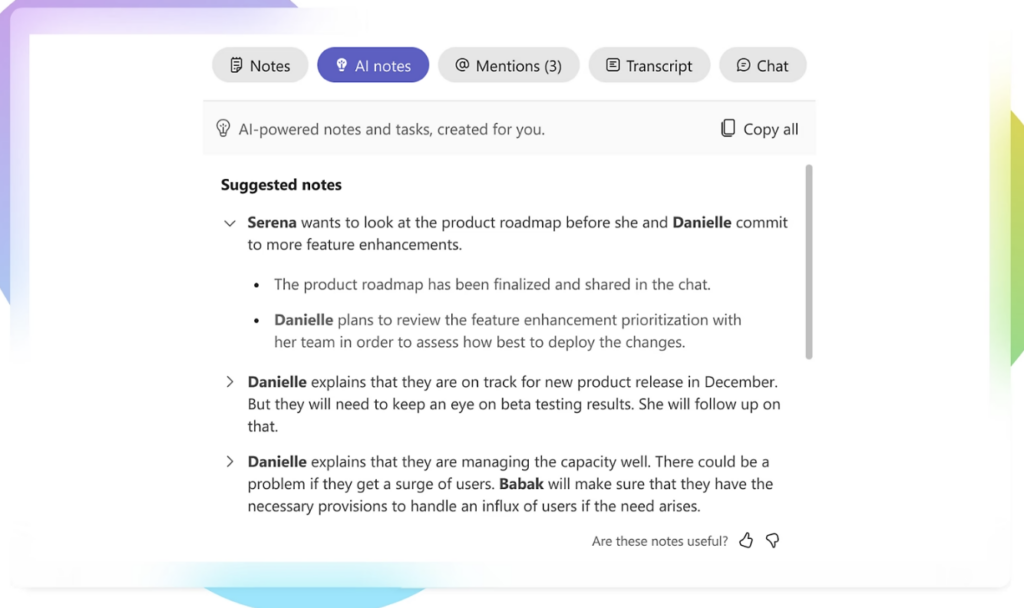
Can Teams Premium Intelligent Recap also be used by companies for meetings that are not in English?
Short answer: currently not. Here are the three main issues:
- Microsoft Teams Premium Intelligent only works if all meeting participants have a Teams Premium license.
- It works only in English. This makes it useless in meetings where, for example, German is spoken.
- It processes your data in the USA, which could be questionable from a data protection point of view.
Is there an alternative for the Teams Premium Intelligent Recap for other languages?
Tucan.ai is the optimal Teams Premium Intelligent Recap alternative.
On the one hand, the data at Tucan.ai is hosted exclusively in Germany, on the other hand, Tucan.ai works not only in English and German, but also in Spanish, French and other languages.
In addition, Tucan.ai offers more flexibility in meeting summaries and lets users define what they want to know about a particular meeting via freely definable queries. Read more...
Overview
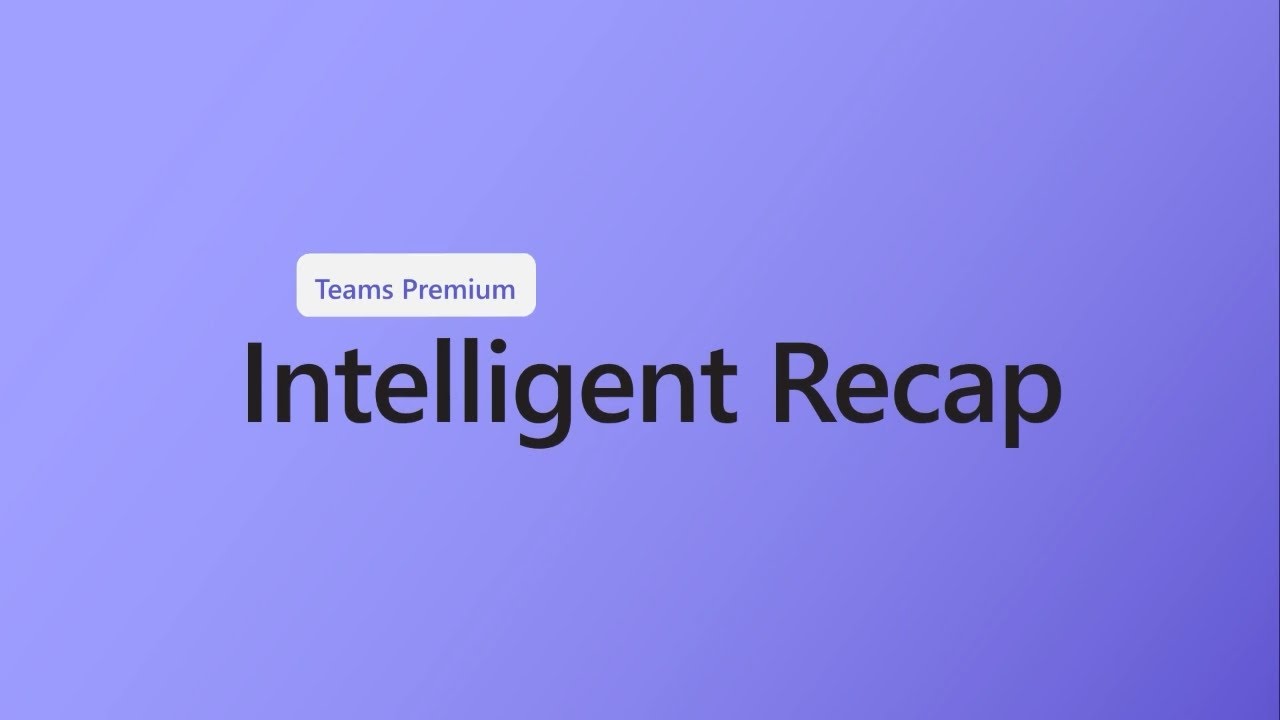 |
||
|---|---|---|
| Microsoft Teams integration | Yes | Yes |
| Zoom integration | Yes | No |
| Google Meet integration | Yes | No |
| WebEx integration | Yes | No |
| Works for in-person meetings | Yes | No |
| Import pre-recorded audio/video files | Yes | No |
| Meeting transcripts | Yes | Yes |
| Automatic speaker recognition | Yes | Yes |
| Customizable to (corporate) technical vocabulary | Yes | No |
| Meeting summaries | Custom | Generic |
| Textdocument summaries | Yes | No |
| PDF summaries | Yes | No |
| Languages | English, German, Spanish, French, +5 more | English |
| Works in all countries | Yes | No |
| Data processing location | Germany | USA |
| On-premise solution | Optional | N/A |
Status: October 2023
Outsmart your competition!
Tucan.ai helps you analyze and manage your interviews, conversations and meetings by automatically transcribing, organizing and summarizing the data.
Book a free consultation call!
Meeting summaries comparison
Teams Premium Intelligent Recap meeting summaries are based on standard templates. It should be noted that all meeting participants without exception must have a Teams Premium account in order for the feature to function without restriction. If this is the case, and the Teams Transcription feature is enabled, all participants receive a generated standard summary of the meeting that highlights important topics and outlines next steps.
Standard, highlight and follow-up summaries can be easily created with Tucan.ai. However, enterprise customers can also access complex custom summaries. With Tucan.ai one or more custom statements can be used to pull out different information depending on the type of meeting.
Summaries in keywords or complete sentences, the next to-dos, a mood or sentiment analysis of the meeting and much more can be requested. Furthermore, these things can be queried for specific information from the meeting. There are no limits for the user here.
Meeting summaries in Tucan.ai:
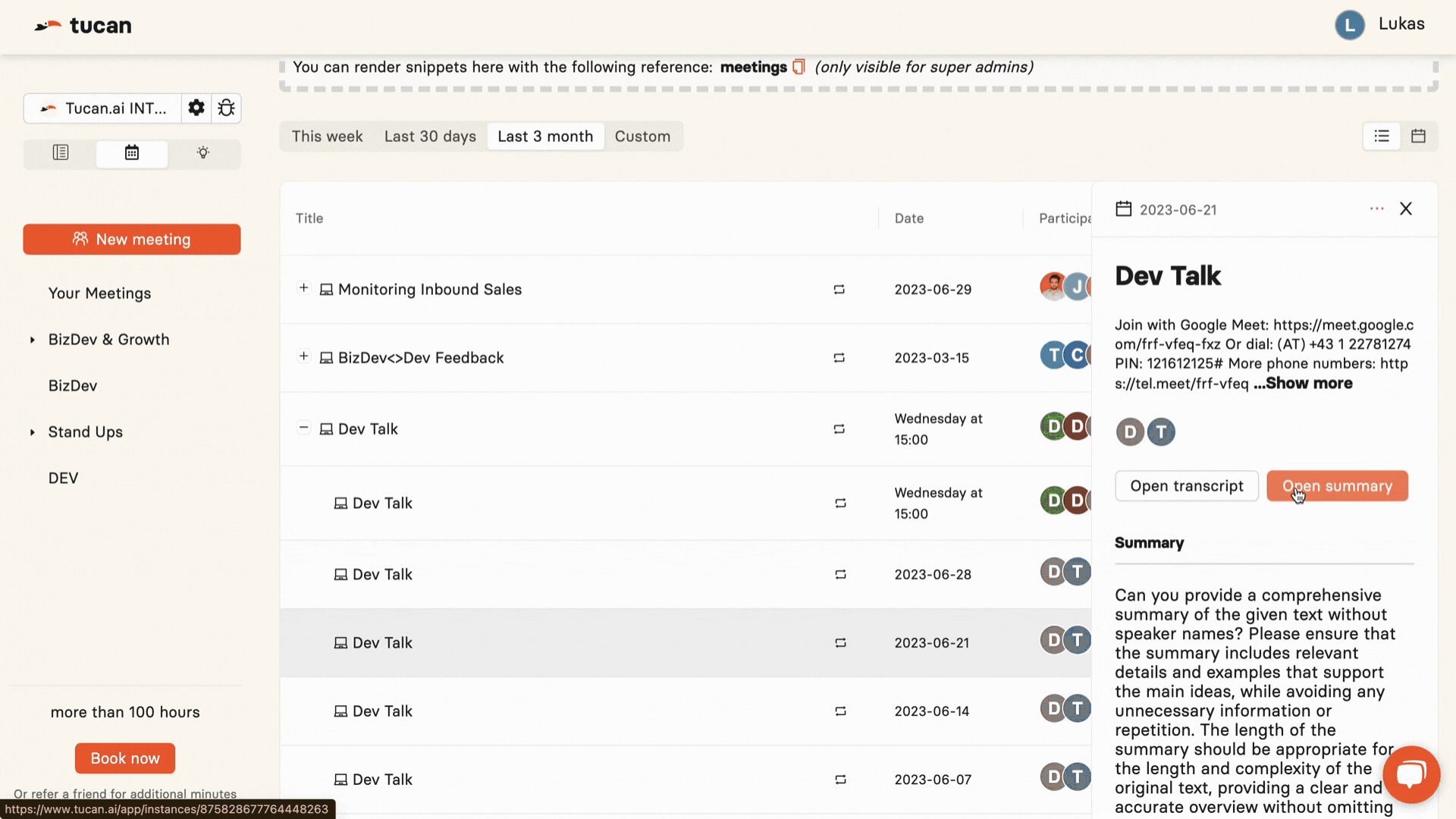
Meeting summaries in Teams:

Looking for an enterprise solution?
Whether custom data model training, custom workflow integrations, cloud or on-premise, or advanced security features, anything is possible with Tucan.ai. Tailor your package to your needs together with your personal Tucan.ai advisor.
Book a free consultation call!
Microsoft Teams Premium Intelligent Recap für deutschsprachige Nutzer? Tucan.ai ist die Alternative!
Was ist Microsoft Teams Premium Intelligent Meeting Recap?
Das "Intelligent Recap" Feature von Microsoft Teams Premium nutzt KI, um automatisch einen umfassenden Überblick über Meetings zu geben. Dabei soll es Nutzern helfen, Zeit zu sparen und die nächsten Schritte zu koordinieren. Teams Premium Kunden sollen so automatisch generierte Besprechungsnotizen, empfohlene Aufgaben und personalisierte Hervorhebungen erhalten, damit sie schnell die wichtigsten Informationen finden, selbst wenn sie ein Meeting verpassen.
Intelligent Recap ist derzeit nur auf Englisch und nur für Teams Premium Kunden verfügbar. Weitere Sprachen sollen im Herbst 2023 folgen. Jedoch ist nicht ersichtlich wann genau - in diversen Microsoft Foren sind derzeit Verzögerungen und Probleme mit der Implementierung in EU-Staaten heraus zu lesen.

Kann Teams Premium Intelligent Recap auch von Unternehmen im deutschen Sprachraum eingesetzt werden?
Theoretisch schon, ja. Dabei gibt es in der Praxis aber 3 Probleme:
- Microsoft Teams Premium Intelligent funktioniert nur, wenn alle Meeting Teilnehmer eine Teams Premium Lizenz haben.
- Es funktioniert nur auf Englisch. Damit ist es in Meetings, in denen z.B. Deutsch gesprochen wird nutzlos.
- Es verarbeitet Ihre Daten in den USA, was aus Datenschutz-Sicht bedenklich sein könnte.
Gibt es eine Alternative für den Teams Premium Intelligent Recap für deutschsprachige Nutzer?
Tucan.ai ist die optimale Teams Premium Intelligent Recap Alternative für Nutzer aus dem deutschen Sprachraum.
Einerseits werden die Daten bei Tucan.ai ausschließlich in Deutschland gehostet, anderseits funktioniert Tucan.ai nicht nur auf Englisch und Deutsch, sondern auch Spanisch, Französisch und weiteren Sprachen.
Zudem bietet Tucan.ai mehr Flexibilität bei Meeting-Zusammenfassungen und lässt Nutzer über frei definierbare Abfragen selbst festlegen, was sie über ein bestimmtes Meeting wissen wollen. Mehr dazu...
Übersicht
 |
||
|---|---|---|
| Microsoft Teams Integration | Ja | Ja |
| Zoom Integration | Ja | Nein |
| Google Meet Integration | Ja | Nein |
| Funktioniert für In-Person Meetings | Ja | Nein |
| Import von voraufgezeichneten Audio-/Videodateien | Ja | Nein |
| Meeting Transkripte | Ja | Ja |
| Automatische Sprechererkennung | Ja | Ja |
| Meeting Zusammenfassungen | Benutzerdefiniert | Generisch |
| Sprachen | Englisch, Deutsch, Spanisch, Französisch, +5 mehr | English |
| Funktioniert in allen Ländern | Ja | Eingeschränkt |
| Ort der Datenverarbeitung | Deutschland | USA |
| On-premise Lösung | Optional für Unternehmenskunden | N/A |
Stand: Oktober 2023
Hängen Sie Ihre Konkurrenz ab!
Tucan.ai hilft Ihnen bei der Analyse und Verwaltung Ihrer Interviews, Gespräche und Meetings durch automatisches Transkribieren, Organisieren und Zusammenfassen der Daten.
Buchen Sie einen kostenlosen Beratungstermin!
Meeting-Zusammenfassungen im Vergleich
Die Meeting-Zusammenfassungen von Teams Premium Intelligent Recap basieren auf Standardvorlagen. Hierbei ist zu beachten, dass ausnahmslos alle Meeting-Teilnehmer einen Teams Premium Account haben müssen, damit das Feature uneingeschränkt funktioniert. Ist das der Fall, und ist die Teams Transkriptionsfunktion aktiviert, erhalten alle Teilnehmer eine generierte Standardzusammenfassung des Meetings, die wichtige Themen hervorhebt und die nächsten Schritte skizziert.
Standard-, Highlight- und Folgezusammenfassungen können mit Tucan.ai einfach erstellt werden. Unternehmenskunden können aber auch auf komplexe benutzerdefinierte Zusammenfassungen zugreifen. Mit Tucan.ai können eine oder mehrere benutzerdefinierte Anweisungen verwendet werden, um je nach Art des Meetings verschiedene Informationen herauszuziehen.
Abgefragt werden können Zusammenfassungen in Stichworten oder ganzen Sätzen, die nächsten To-Dos, eine Stimmungs- oder Sentimentanalyse des Meetings und vieles mehr. Darüber hinaus können diese Dinge nur für bestimmte Informationen aus dem Meeting abgefragt werden. Dem Nutzer sind hier keine Grenzen gesetzt.
Meeting-Zusammenfassungen in Tucan.ai:

Meeting-Zusammenfassungen in Teams:

Auf der Suche nach einer Enterprise Lösung?
Ob benutzerdefiniertes Datenmodell-Trainings, kundenspezifische Workflow-Integrationen, Cloud oder On-Premise, oder erweiterte Sicherheitsfunktionen, mit Tucan.ai ist alles möglich. Schneiden Sie Ihr Paket gemeinsam mit Ihrem persönlichen Kundenberater auf Ihre Bedürfnisse zu.
Buchen Sie einen kostenlosen Beratungstermin!
Zoom AI Companion für deutschsprachige Nutzer? Tucan.ai ist die Alternative!
Was sind Meeting-Zusammenfassungen mit Zoom AI Companion?
Die Meeting-Zusammenfassung des Zoom AI Companion nutzt künstliche Intelligenz, die Modelle von Drittanbietern einbeziehen kann, um eine KI-generierte Zusammenfassung Ihrer Zoom-Meetings zu erstellen. Wenn ein Gastgeber diese Option während eines Meetings aktiviert, können die Teilnehmer nach Abschluss des Meetings eine automatische Zusammenfassung erhalten, vorausgesetzt, der Gastgeber entscheidet sich, die Zusammenfassung mit ihnen zu teilen.
Derzeit ist die Zoom AI Companion Meeting Summary Funktion nur in Englisch und nicht in allen Ländern für lizenzierte Nutzer mit einem Zoom Pro, Zoom One Business, Zoom One Business Plus, Zoom One Enterprise, Zoom One Enterprise Plus oder Enterprise Bundle Account verfügbar.
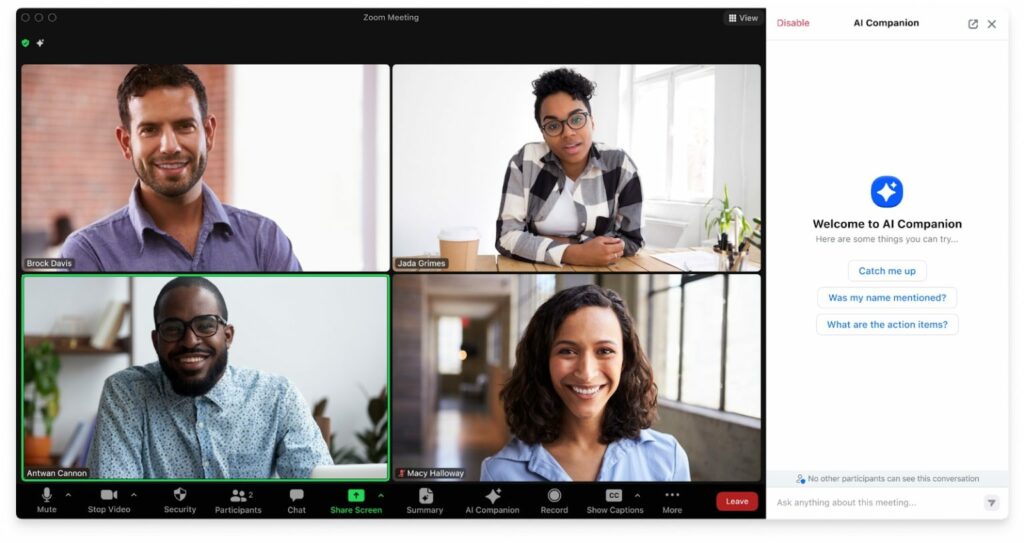
Kann der Zoom AI Companion auch von Unternehmen im deutschen Sprachraum eingesetzt werden?
Theoretisch schon, ja. Dabei gibt es in der Praxis aber 3 Probleme:
- Zoom hat die Funktion nur auf bestimmte Länder eingeschränkt, ohne dabei genau zu nennen welche. Anfragen müssen individuell an das Zoom Business Team gestellt werden.
- Es funktioniert nur auf Englisch. Damit ist es in Meetings, in denen z.B. Deutsch gesprochen wird nutzlos.
- Es verarbeitet Ihre Daten in den USA, was aus Datenschutz-Sicht bedenklich sein könnte.
Gibt es eine Alternative für den Zoom AI Companion für deutschsprachige Nutzer?
Tucan.ai ist die optimale Zoom AI Companion Alternative für Nutzer aus dem deutschen Sprachraum.
Einerseits werden die Daten bei Tucan.ai ausschließlich in Deutschland gehostet, anderseits funktioniert Tucan.ai nicht nur auf Englisch und Deutsch, sondern auch Spanisch, Französisch und weiteren Sprachen.
Zudem bietet Tucan.ai mehr Flexibilität bei Meeting-Zusammenfassungen und lässt Nutzer über frei definierbare Abfragen selbst festlegen, was sie über ein bestimmtes Meeting wissen wollen. Mehr dazu...
Übersicht
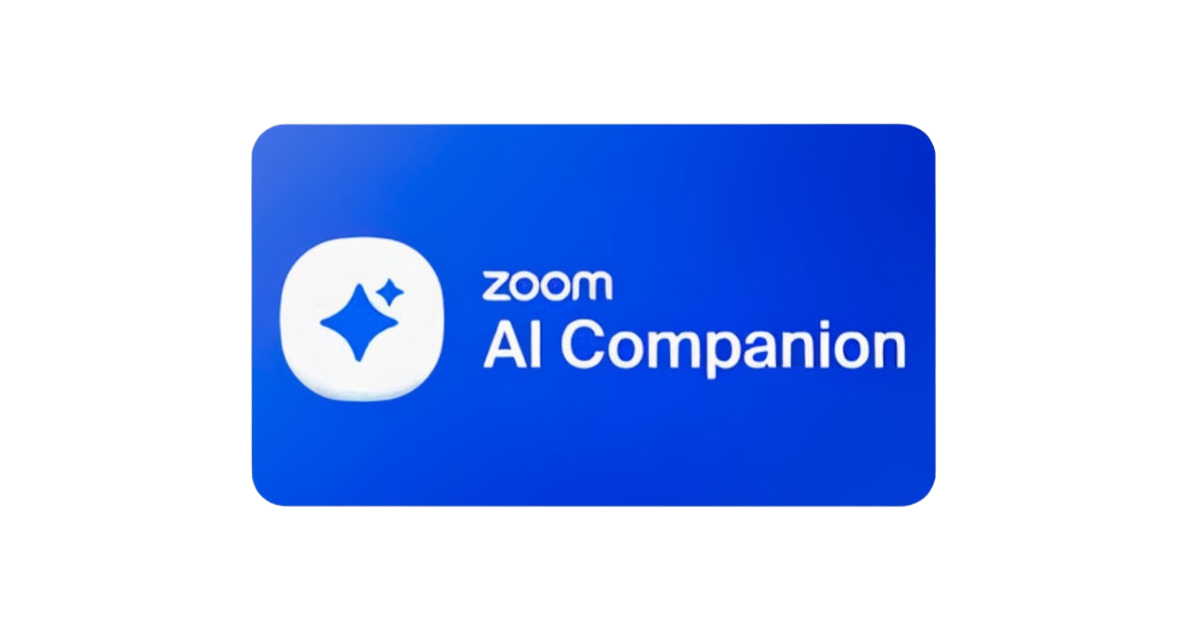 |
||
|---|---|---|
| Zoom Integration | Ja | Ja |
| Microsoft Teams Integration | Ja | Nein |
| Google Meet Integration | Ja | Nein |
| Funktioniert für In-Person Meetings | Ja | Nein |
| Import von voraufgezeichneten Audio-/Videodateien | Ja | Nein |
| Meeting Transkripte | Ja | Ja |
| Automatische Sprechererkennung | Ja | Ja |
| Meeting Zusammenfassungen | Benutzerdefiniert | Generisch |
| Sprachen | Englisch, Deutsch, Spanisch, Französisch, +5 mehr | English |
| Funktioniert in allen Ländern | Ja | Nein |
| Ort der Datenverarbeitung | Deutschland | USA |
| On-premise Lösung | Optional für Unternehmenskunden | N/A |
Stand: Oktober 2023
Hängen Sie Ihre Konkurrenz ab!
Tucan.ai hilft Ihnen bei der Analyse und Verwaltung Ihrer Interviews, Gespräche und Meetings durch automatisches Transkribieren, Organisieren und Zusammenfassen der Daten.
Buchen Sie einen kostenlosen Beratungstermin!
Meeting-Zusammenfassungen im Vergleich
Die Meeting-Zusammenfassungen von Zoom AI Companion basieren auf Standardvorlagen. Nur der Meeting-Gastgeber und der Co-Gastgeber können die Meeting-Zusammenfassung über die Funktionen der In-Meeting-Steuerung starten oder stoppen. Nach dem Meeting erhalten alle Teilnehmer eine vom Zoom AI Companion generierte Standardzusammenfassung des Meetings, die wichtige Themen hervorhebt und die nächsten Schritte skizziert.
Standard-, Highlight- und Folgezusammenfassungen können mit Tucan.ai einfach erstellt werden. Unternehmenskunden können aber auch auf komplexe benutzerdefinierte Zusammenfassungen zugreifen. Mit Tucan.ai können eine oder mehrere benutzerdefinierte Anweisungen verwendet werden, um je nach Art des Meetings verschiedene Informationen herauszuziehen.
Abgefragt werden können Zusammenfassungen in Stichworten oder ganzen Sätzen, die nächsten To-Dos, eine Stimmungs- oder Sentimentanalyse des Meetings und vieles mehr. Darüber hinaus können diese Dinge nur für bestimmte Informationen aus dem Meeting abgefragt werden. Dem Nutzer sind hier keine Grenzen gesetzt.
Meeting-Zusammenfassungen in Tucan.ai:

Meeting-Zusammenfassungen in in Zoom:
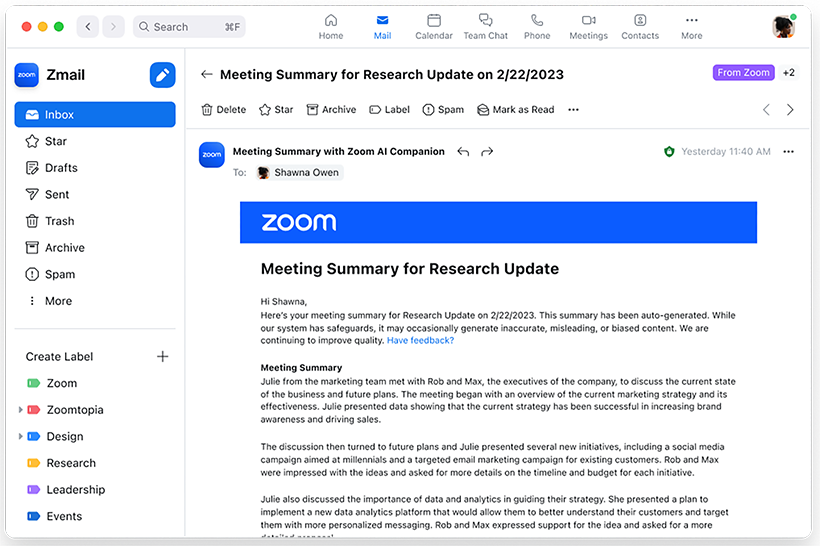
Auf der Suche nach einer Enterprise Lösung?
Ob benutzerdefiniertes Datenmodell-Trainings, kundenspezifische Workflow-Integrationen, Cloud oder On-Premise, oder erweiterte Sicherheitsfunktionen, mit Tucan.ai ist alles möglich. Schneiden Sie Ihr Paket gemeinsam mit Ihrem persönlichen Kundenberater auf Ihre Bedürfnisse zu.
Buchen Sie einen kostenlosen Beratungstermin!
Otter.ai vs. Tucan.ai: Which AI tool generates better meeting notes?
What is Otter.ai?
Otter.ai uses artificial intelligence (AI) to create automated meeting notes with transcription, audio recording, and automatic meeting summaries.
The meeting tool from the USA comes with a variety of features. It can help companies, as well as individuals, to make internal as well as external meetings more productive and efficient. This can save them tremendous time (and money).
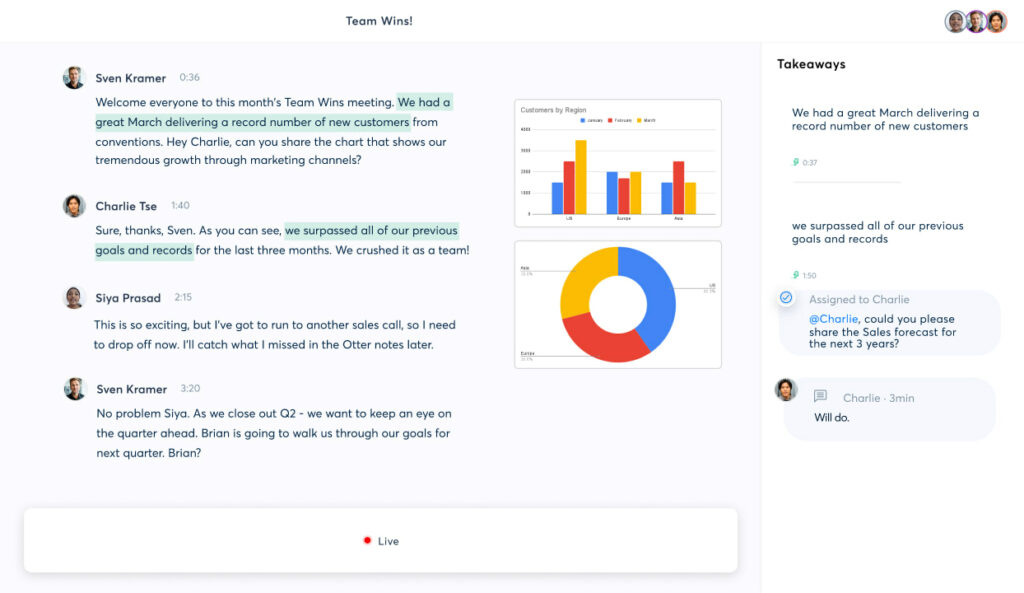
Can Otter.ai also be used by companies in the German-speaking area?
In theory, yes. However, there are 2 problems with this in practice:
- It works only in English. This makes it useless in meetings where, for example, German is spoken.
- It processes your data in the USA, which could be questionable from a data protection point of view.
Is there an alternative for Otter.ai for German speaking users?
Tucan.ai is the optimal Otter.ai alternative for users from the German-speaking area.
On the one hand, the data at Tucan.ai is hosted exclusively in Germany, on the other hand, Tucan.ai works not only in English and German, but also in Spanish and French.
In addition, Tucan.ai offers more flexibility in meeting summaries and lets users define what they want to know about a particular meeting via freely definable queries. Read more...
Overview
 |
||
|---|---|---|
| Zoom Integration | Ja | Ja |
| Microsoft Teams Integration | Ja | Ja |
| Google Meet Integration | Ja | Ja |
| Importieren von voraufgezeichneten Audio-/Videodateien | Ja | Ja |
| Meeting-Transkripte | Ja | Ja |
| Meeting-Zusammenfassungen | Benutzerdefiniert | Generisch |
| Suche nach Gesprächsprotokollen mit Schlüsselwort | Ja | Ja |
| Automatische Sprechererkennung | Ja | Ja |
| Sprachen | Englisch, Deutsch, Spanisch, Französisch | Englisch |
| Daten-Verarbeitungsstandort | Deutschland | USA |
| On-Premise-Lösung | Optional für Enterprise Kunden | N/A |
Status: June 2023
Outsmart your competition!
Tucan.ai helps you analyze and manage your interviews, conversations and meetings by automatically transcribing, organizing and summarizing the data.
Book a free consultation call!
Meeting summaries comparison
The summaries of otter.ai are rather generic in nature. However, the most important points well and clearly summarized in stick points.
Simple summaries can also be created with Tucan.ai. Enterprise customers can also access complex user-defined meeting summaries. Similar to Chat-GPT, one or more custom instructions can be used to pull out various information depending on the meeting type.
Summaries in keywords or complete sentences, the next to-dos, the mood in the meeting and much more can be queried. However, these things can also be queried only for a specific person, for example, if you want to know the tasks resulting from the meeting only for this person. There are no limits for the user here.
Meeting summary in Tucan.ai:

Meeting summary in otter.ai:
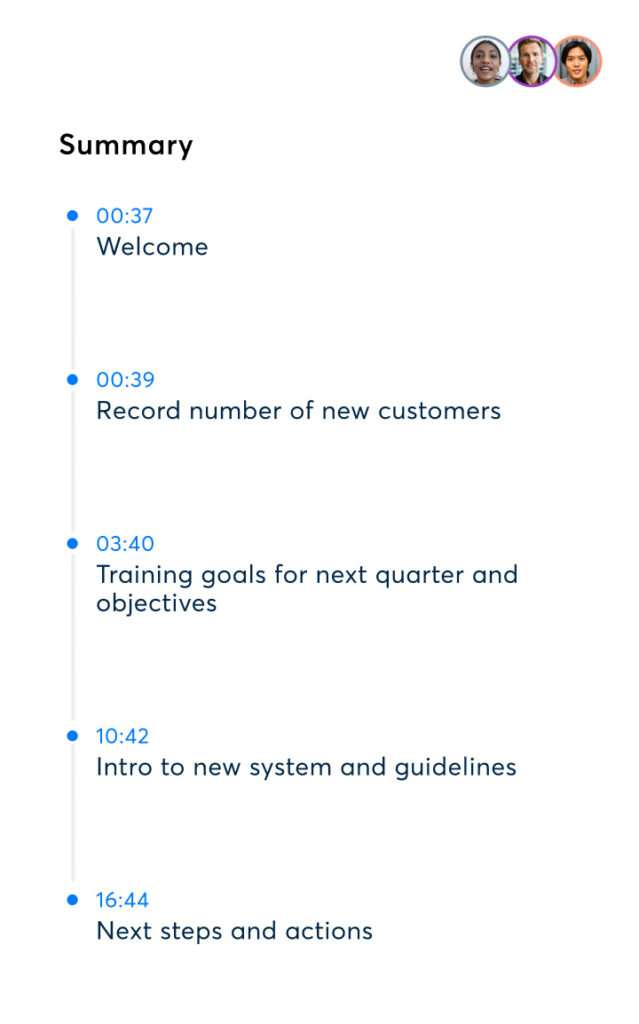
Looking for an enterprise solution?
Whether custom data model training, custom workflow integrations, TucanGPT, cloud or on-premise, or advanced security features, anything is possible with Tucan.ai. Tailor your package to your needs together with your personal customer advisor.
Book a free consultation call!
Zoom vs. Tucan.ai: Which AI tool generates better meeting notes?
What are Meeting Summaries with Zoom AI Companion?
The Zoom AI Companion's Meeting Summary feature employs artificial intelligence technology, which may incorporate third-party models, to empower meeting hosts to trigger an AI-generated summary of their meetings. When a host activates this option during a meeting, attendees may receive an automatic summary following the meeting's conclusion, provided that the host decides to share the summary with them.
Currently, the Zoom AI Companion Meeting Summary feature is only available in English and not in all countries to licensed users on a Zoom Pro, Zoom One Business, Zoom One Business Plus, Zoom One Enterprise, Zoom One Enterprise Plus, or Enterprise Bundle account.

Is there an alternative for Zoom AI Companion?
Tucan.ai is the optimal Zoom AI companion alternative - especially when it comes to customized enterprise solutions, Tucan.ai offers advantages.
Overview
 |
||
|---|---|---|
| Zoom integration | Yes | Yes |
| Microsoft Teams integration | Yes | No |
| Google Meet integration | Yes | No |
| Import pre-recorded audio/video files | Yes | No |
| Meeting transcripts | Yes | Yes |
| Automatic speaker recognition | Yes | Yes |
| Search meeting archive with keyword | Yes | No |
| Meeting summaries | Custom | Generic |
| Languages | English, German, Spanish, French, +5 more | English |
| Works in all countries | Yes | No |
| Data processing location | Germany | USA |
| On-premise solution | Optional for enterprise customers | N/A |
Status: October 2023
Outsmart your competition!
Tucan.ai helps you analyze and manage your interviews, conversations and meetings by automatically transcribing, organizing and summarizing the data.
Meeting summaries: a comparison
Zoom AI Companion's Meeting Summaries are based on default templates. Only the meeting host and co-host can start or stop the meeting summary through the features in-meeting controls. After the meeting, all participants will receive a default summary of the meeting, generated by the Zoom AI companion, which highlights important topics, and outlines next steps.
Default, highlight and follow-on summaries can easily be created with Tucan.ai. However, enterprise customers can also access complex user-defined meeting summaries. With Tucan.ai one or more custom instructions can be used to pull out various information depending on the meeting type.
Summaries in keywords or complete sentences, the next to-dos, a mood- or sentiment analysis of the meeting and much more can be queried. Furthermore these things can be prompted only for specific information resulting from the meeting. There are no limits for the user here.
Meeting summary in Tucan.ai:

Meeting summary in Zoom:
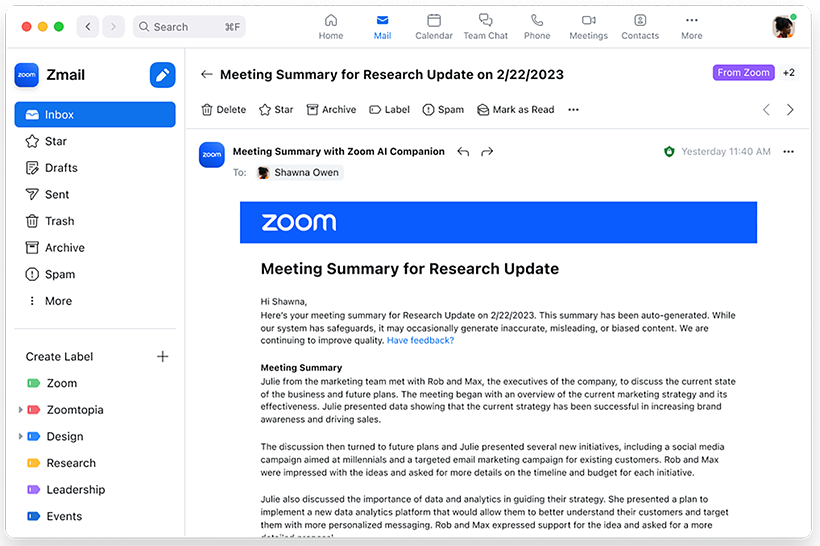
Looking for an enterprise solution?
Whether custom data model training, custom workflow integrations, cloud or on-premise, or advanced security features, anything is possible with Tucan.ai. Tailor your package to your needs together with your personal customer advisor.
Book a free consultation call!
Gesprächsintelligenz für Juristen: Anwendungsfälle und Lösungen
Mit der zunehmenden Verbreitung von KI in der Rechtsbranche delegieren Anwälte, Juristen und Anwaltsgehilfen immer mehr Arbeit an intelligente Computer, die sich im Laufe ihrer Arbeit verbessern. So berichtet der Mitbegründer des Harvard Journal of Law & Technology Lauri Donahue, dass Juristen zunehmend KI-Tools für die Überprüfung von Dokumenten, die Analyse von Verträgen, Recherchen und die Vorhersage von Ergebnissen einsetzen.
In diesem Artikel gehen wir darauf ein, wie KI, insbesondere Konversationsintelligenz, Anwaltskanzleien verändert und geben Beispiele für die gängigen Tools, die Unternehmen heute einsetzen. Werfen wir jedoch zunächst einen Blick auf den boomenden Bereich der Computerlinguistik und Gesprächsintelligenz.

Der Markt für KI und Computerlinguistik boomt
Die Marktgröße für künstliche Intelligenz beträgt im Jahr 2021 87 Milliarden US-Dollar. Bis 2030 werden es 1,6 Billionen Dollar sein. Das ist eine 18-fache Steigerung. Ebenso wird ein Teilbereich der KI, die Computerlinguistik, von 21 Milliarden im Jahr 2021 auf 127 Milliarden im Jahr 2028 wachsen.
Die Marktgröße explodiert, weil die Unternehmen den starken Geschäftsnutzen von KI-Tools erkennen. Und sie nutzen es sowohl extern auf dem Markt als auch intern in ihrer Belegschaft. Es besteht eine starke Nachfrage nach KI-Tools, aber sie werden immer noch oft missverstanden. Die Aussage, "unsere Software nutzt KI", ist ziemlich vage. Um ein klareres Bild zu zeichnen, lassen Sie uns einen wichtigen Teilbereich der KI, die Konversationsintelligenz, definieren und die praktischen Einsatzmöglichkeiten von KI aufzeigen.
Wie kann Gesprächsintelligenz wirksam eingesetzt werden?
Konversationsintelligenz bezieht sich auf die Tools, die KI nutzen, um mit Nutzern oder Kunden zu sprechen. Diese Tools, die häufig als Chatbots oder virtuelle Assistenten bezeichnet werden, ziehen große Datenmengen und lassen sie durch maschinelles Lernen und natürliche Sprachverarbeitung laufen, um auf natürliche Weise wie ein Mensch zu sprechen.
Gesprächsintelligenz ist ein Teilgebiet der Computerlinguistik, der Untersuchung von Sprache aus der Perspektive von Computern. Einfach ausgedrückt, geht es darum, die Kommunikation zwischen Mensch und Computer zu erleichtern, vor allem durch das gesprochene Wort, aber auch durch schriftliche Kommunikation.
TechTarget erklärt, dass das Wissen, das der Computerlinguistik zugrunde liegt, Werkzeuge "wie maschinelle Sofortübersetzung, Spracherkennungssysteme, Text-zu-Sprache-Synthesizer, interaktive Sprachdialogsysteme, Suchmaschinen, Texteditoren und Sprachlehrmittel" antreibt.
Sie wollen Tucan.ai für Ihr Unternehmen testen?
Buchen Sie einen kostenlosen Beratungstermin!
Anwendungsfälle für Conversational Intelligence in Anwaltskanzleien
Lassen Sie uns nun Anwendungsfälle für Computerlinguistik und Konversationsintelligenz in Anwaltskanzleien untersuchen. Im Folgenden stellen wir drei wichtige Möglichkeiten vor, wie Anwaltskanzleien heute (und in Zukunft) KI nutzen werden.
Automatisierte Dokumentation
Die juristische Dokumentation, seien es interne Aufzeichnungen oder Abschriften von Gerichtsverfahren, wird je nach Person oder Gericht oft unterschiedlich gehandhabt. Mithilfe von KI beschleunigen Anwaltskanzleien den mühsamen Prozess der manuellen Dateneingabe.
Mithilfe von KI können Anwaltskanzleien große Mengen an unstrukturierten Dokumentationsnotizen analysieren und in standardisierte Vorlagen einordnen. Das spart nicht nur enorm viel Zeit, sondern verringert auch das Risiko manueller Fehler.
Die KI kann dies tun, indem sie Methoden zur Verarbeitung natürlicher Sprache einsetzt, die Gesprächsinhalte kodieren, sei es von Sprache zu Text oder von Text zu Text, und deren Bedeutung verstehen. Sprachmodelle sind heute leistungsfähig genug, um sowohl die Absicht als auch den Inhalt einer Nachricht zu erfassen und sie entsprechend zu gestalten.
Chatbots
Wie bei vielen Unternehmen mit Websites haben die Besucher spezifische Fragen, die sie beantwortet haben wollen, und sie wollen schnell Antworten. Sie wollen sich nicht erst durch ein Dutzend Seiten klicken, um die Antwort zu finden. Stattdessen wollen sie ein Portal, über das sie mit dem Kundendienst in Verbindung treten können.
Diesem Bedarf gerecht zu werden, ist für Anwälte und ihre Kanzleien jedoch eine Herausforderung. Wenn sie täglich Hunderte von Besuchern haben, brauchen sie dann eine Flotte von Servicemitarbeitern, die bereit sind, eingehende Fragen zu beantworten? Benötigen speziell Anwaltskanzleien erfahrene Mitarbeiter, die sie online beraten können? Nicht ganz.
Chatbots sind ein weiterer wachsender Anwendungsfall in Anwaltskanzleien. TimeSolv beschreibt Chatbots als "Computerprogramme, die entwickelt wurden, um ein interaktives Kundenerlebnis ohne tatsächliche menschliche Interaktion zu bieten".
Anwaltskanzleien können Chatbots einsetzen, um Fragen von Besuchern schnell zu beantworten. Und über einfache Fragen oder Anweisungen hinaus können KI-Chatbots in Anwaltskanzleien allgemeine rechtliche Fragen präzise beantworten und Besucher bei Bedarf an die richtigen Anwälte oder Ressourcen verweisen. Und schließlich können Chatbots ein wirksames Mittel sein, um die Kommunikation mit Kunden zu verbessern.
Automatische Vertragserstellung und -prüfung
Der dritte Anwendungsfall, die Erstellung und Überprüfung von Verträgen durch KI, befindet sich noch im Anfangsstadium, hat aber ein großes Potenzial. Heute gibt es keine KI-Plattformen, die automatisch juristische Verträge oder Empfehlungen generieren, aber sie unterstützen Anwälte, indem sie die relevantesten Ressourcen aufzeigen, wie zum Beispiel Präzedenzfälle für Gerichtsverfahren.
Genauso wie KI-Tools den Mitarbeitern helfen können, Dokumente oder Notizen in Vorlagen zu kategorisieren, können sie auch juristische Vertragsvorlagen ausfüllen. Die Anwälte füllen einen Fragebogen aus, der die Daten kodiert, sie mit anderen relevanten Ressourcen verbindet und einen aussagekräftigen ersten Entwurf erstellt. Dies kann den Prozess drastisch beschleunigen. Die Grenzen liegen jedoch bei der Personalisierung. Gegenwärtig können Anwälte den Code, mit dem diese Entwürfe erstellt werden, nicht ohne weiteres an die Bedürfnisse ihrer Mandanten anpassen. Mit der rasanten Entwicklung der KI könnte dies jedoch eine Fähigkeit sein, die die KI-Technologie schnell erreicht.
Sie wollen Tucan.ai für Ihr Unternehmen testen?
Buchen Sie einen kostenlosen Beratungstermin!
KI-Tools, die für Anwaltskanzleien besonders nützlich sind
Nachdem wir uns nun drei Anwendungsfälle angeschaut haben, möchten Sie vielleicht selbst loslegen. Im Folgenden finden Sie drei Tools, die Anwaltskanzleien bereits heute einsetzen können.
OneLaw
OneLaw ist ein KI-Assistent, der für Anwaltskanzleien entwickelt wurde. Ihre KI-Assistentin namens Amelia fungiert als
Multi-Channel, d. h. sie kann mit den Kunden sprechen, simsen, mailen und chatten". Anwaltskanzleien nutzen Amelia bereits, um ihre Kundenbeziehungen ohne Qualitätseinbußen zu verbessern.
Amelia kann dabei helfen, Leads zu betreuen, indem sie sie auf die Informationen oder die Unterstützung hinweist, die sie benötigen. Außerdem ist sie rund um die Uhr online und auf allen Kommunikationskanälen präsent, so dass kein potenzieller Kunde verloren geht. Amelia spricht über 40 Sprachen und gilt laut Website als "die menschlichste KI™-Agentin mit den besten Konversationsfähigkeiten".
Lawgeex
Lawgeex ist ein KI-Tool, das Verträge validiert, um sicherzustellen, dass sie mit den vordefinierten Richtlinien übereinstimmen, und Vorschläge für die Bearbeitung macht, wenn sie nicht den Standards des Unternehmens entsprechen. Lawgeex versteht den Kontext Ihrer Position und analysiert Ihre Politik, um die genauesten Empfehlungen und relevanten Redlines zu geben.
Der größte Vorteil für Anwaltskanzleien, die Lawgeex nutzen, ist die Erhöhung der Geschwindigkeit. Sie behaupten, dass sie "als Erweiterung Ihres Rechtsteams fungieren und Ihnen eine einheitlichere Vertragsprüfung in einem Bruchteil der Zeit ermöglichen". Sie stellen auch die Positionen, Risiken und Richtlinien Ihrer Kanzlei in digitalen juristischen Playbooks zusammen, so dass dass jeder Vertrag so geprüft wird, wie es ein interner Anwalt tun würde.
Tucan.ai
Tucan.ai ist wie Ihr kluger und stiller Stenograf, der Sie bei jedem Meeting begleitet, Ihre Gespräche dokumentiert und intelligent archiviert. Es transkribiert und fasst alle Anrufe oder Besprechungen zusammen, die Sie im Laufe eines Tages führen. Nur, dass sie keine Vollzeit-Assistentin sind, sondern eine KI-Plattform.
Tucan.ai macht Ihre Unterhaltungen besser verwertbar, indem es bestimmte Informationen extrahiert und die wichtigsten Erkenntnisse als Zusammenfassung herauszieht. Außerdem werden Sie an eventuelle Nachfassaktionen erinnert, damit Sie nichts verpassen.
Wenn verschiedene Mitarbeiter Ihres Unternehmens persönlich, in Telefonkonferenzen und per E-Mail mit Kunden zusammentreffen, können Aufgaben und wichtige Informationen unter den Tisch fallen. Tucan.ai läuft im Hintergrund und erfasst die relevantesten Informationen. Ob per Bot oder Download, alles kann automatisch transkribiert werden, so dass Sie ein Gespräch später leicht wiederholen können.
Sie wollen Tucan.ai für Ihr Unternehmen testen?
Buchen Sie einen kostenlosen Beratungstermin!
Optimierung von Arbeitsabläufen mit KI-gestützter Gesprächsinformation
In diesem Artikel haben wir dafür plädiert, dass Anwaltskanzleien die transformativen Auswirkungen erkennen müssen, die KI-Anwendungen in ihrer Branche haben werden. Diese Veränderungen sind in der Tat bereits im Gange.
Damit Anwaltskanzleien auf dem neuesten Stand und wettbewerbsfähig bleiben, ist es an der Zeit, innovativ zu sein, Veränderungen innerhalb ihrer Abläufe voranzutreiben und verschiedene KI-Tools zu testen. Diese Werkzeuge können ihnen einen Vorteil gegenüber ihren Mitbewerbern verschaffen und die traditionell manuellen Verfahren rationalisieren.
Die drei in diesem Artikel vorgestellten Tools OneLaw, Lawgeex und Tucan sind großartige Möglichkeiten, in die anderen drei Anwendungsfälle einzudringen, die wir in diesem Artikel beschrieben haben. Sie helfen Ihnen dabei, Ihre Kundenbetreuung zu optimieren, Verträge zu entwerfen und Ermittlungen durchzuführen. Wir empfehlen: Beginnen Sie jetzt!

Conversational intelligence for legal professionals: Use cases and solutions
As AI becomes more prevalent in the legal industry, lawyers, attorneys, and paralegals delegate more work to smart computers that improve as they are using them. For instance, the co-founder of the Harvard Journal of Law & Technology Lauri Donahue reports that legal professionals make increasing use of AI tools for reviewing documents, analysing contracts, researching as well as predicting outcomes.
In this article, we’ll detail how AI, specifically conversational intelligence, is transforming law firms and give examples of the common tools firms are employing today. First, however, let’s back up and take a look at the booming field of computational linguistics and conversational intelligence.

The market for AI and computational linguistics is booming
The market size for artificial intelligence was $87 billion (USD) in 2021. By 2030, it will be $1.6 trillion. That’s an 18x increase. Likewise, a subset of AI, computational linguistics, is set to grow from 21 billion in 2021 to 127 billion in 2028.
The market size is exploding, because organisations see the strong business case for AI tools. And they’re leveraging it both externally in the market and internally, in their workforce. There is a strong demand for AI tools, but they’re still often misunderstood. Saying, “our software uses AI,” is pretty vague. To paint a clearer picture, let’s define a key subset of AI, conversational intelligence and practical uses for it today.
How can conversational intelligence be applied effectively?
Conversational intelligence refers to the tools that leverage AI to speak with users or customers. Commonly chatbots or virtual assistants, these tools pull large volumes of data and run it through machine learning and natural language processing to speak in a natural way like a human.
Conversational intelligence is a branch of computational linguistics, the study “of language from a computational perspective.” Simply put, it’s determining how to make it easier for humans to communicate with computers, primarily through spoken word, but also written communication.
TechTarget explains that the knowledge underpinning computational linguistics powers tools “like instant machine translation, speech recognition systems, text-to-speech synthesizers, interactive voice response systems, search engines, text editors and language instruction materials.”
You want to test Tucan.ai for your Company?
Book a free consultation call!
Use cases for conversational intelligence in law offices
Now let’s turn to explore use cases for computational linguistics and conversational intelligence within law firms. Below, we outline three important ways that law firms today (and many in the future) will use AI.
Automated documentation
Legal documentation, whether internal notes or transcripts of court proceedings, is often done differently depending on the person or court. Using AI, law firms are speeding up the laborious process of manually entering data.
With AI, law firms can analyse large amounts of unstructured documentation notes and organise them into standardised templates. This not only saves a tremendous amount of time, but also reduces the risk of manual errors.
The AI can do this by using natural language processing methods that encode conversational content, whether speech-to-text and text-to-text, and understand its meaning. Language models today are powerful enough to comprehend both the intent and the substance of a message and organise it accordingly.
Chatbots
Just like many businesses with websites, visitors have specific questions they want answered and they want answers fast. They don’t want to click through a dozen pages to find their answer. Instead, they want a portal to connect with client service.
But meeting this need is challenging for lawyers and their offices. If they have hundreds of visitors a day, do they need a fleet of service reps ready to answer incoming questions? For law firms specifically, do they need experienced associates online to provide expert advice? Not exactly.
Chatbots are another growing use case within law firms. TimeSolv describes chatbots as “computer programs designed to deliver an interactive customer experience without actual human interaction.”
Law firms can use chatbots to quickly answer questions that visitors have. And beyond simple questions or instruction, AI chatbots within law firms can answer common legal questions with accuracy and point visitors toward the right attorneys or resources if needed. Finally, chatbots can be a powerful way to advance communications with clients.
Automatic contract drafting and review
This third use case, having AI draft legal contracts and review them, is still in its nascent stage, but has a lot of potential. Today, we don’t have AI platforms automatically generating legal contracts or recommendations, but they do assist lawyers by surfacing the most relevant resources, like precedent cases for lawsuits, as an example.
In the same way that AI tools can help associates categorise documents or notes into templates, they can also fill in template legal contracts. Lawyers fill out a questionnaire that encodes the data, pairs it with other relevant resources, and creates a strong first draft. This can drastically speed up the process. The limitations, however, are with personalisation. Right now, lawyers can’t easily adjust the code that creates these drafts so that it’s tailored to their clients’ needs. But as AI rapidly grows, this may be a capability AI technology quickly achieves.
You want to test Tucan.ai for your Company?
Book a free consultation call!
AI tools that are particularly useful for law offices
Now that we’ve looked at three use cases, you may want to actually get started yourself. To do so, we list three tools below that law firms can and are using today.
OneLaw
OneLaw is an AI assistant designed for law firms. Their AI assistant, called Amelia, functions as a multi-channel, “meaning she can speak, text, email, and chat” with clients. Law firms are already using Amelia to scale their levels of client relations without sacrificing quality.
Amelia can help nurture leads by pointing them towards the information or support they need. Likewise, it’s online 24/7 and on every communication channel, so no potential customers fall through the cracks. Amelia speaks over 40 languages, and is recognised “as the Most Human AI™ agent with leading conversational abilities”, according to their website.
Lawgeex
Lawgeex is an AI tool that validates contracts to ensure they are within predefined policies and makes suggestions for editing if they fail to meet the firm’s standards. Lawgeex understands the context of your position and analyses your policies to make the most accurate recommendations and relevant redlines.
The biggest benefit for law firms using Lawgeex is how it increases their speed. They claim to “act as an extension of your legal team, giving you more consistent contract review in a fraction of the time.” They also compile your firm's positions, risks and guidelines into digital legal playbooks so that each contract is reviewed the way an internal attorney would.
Tucan.ai
Tucan.ai is like your astute and quiet stenographer who is with you at every meeting, documents your conversations and archives them smartly. It transcribes and summarises all the calls or meetings you have throughout each day. Except, instead of being a full time executive assistant, they’re an AI platform.
Tucan.ai makes your conversations more actionable by extracting certain information and pulling out the most relevant insights as a summary. Likewise, it flags and reminds you of any follow-ups so nothing is missed.
When different associates at your firm are meeting with clients in person, over conference calls, and via email, tasks and important information can fall through the cracks. Tucan.ai runs in the background capturing the most pertinent information. Whether via bot or download, everything can be automatically transcribed, so if you need to go over a conversation later, it’s easy.
You want to test Tucan.ai for your Company?
Book a free consultation call!
Optimising workflows with AI-powered conversational intel
In this article, we’ve made the case that law firms need to recognise the transformative impact that AI applications will have within their industries. Indeed, these changes are already underway.
For law firms to remain up to date and competitive, it’s time to innovate, push for change within their operations, and start testing different AI tools. These tools can give them an edge over their competition and streamline traditionally manual approaches.
The three tools outlined in this article, OneLaw, Lawgeex, and Tucan are great opportunities to break into the other three use cases we outlined in this article. They’ll help you streamline how you service clients, draft contracts, and complete discovery. We recommend: Get started now!

Automation in full swing: These new AI tools revolutionise CX research
In our rapidly digitally transforming information age, it is becoming more and more difficult to deliver compelling and engaging customer experiences. Market leaders in virtually every industry are now putting personalisation at the heart of their business strategy.
For example, Rodney McMullen, CEO of Kroger, recently described seamlessness and personalisation as two very central areas in which the retail group is now primarily investing. Similarly, market leaders in the apparel (e.g. Nike), restaurant (e.g. Starbucks), banking (e.g. JPMorgan Chase) and home improvement (e.g. Home Depot) industries have all said in the past year that they are now strategically focusing on seamless, personalised omnichannel experiences.
Surveys show that customers who have had positive experiences with brands spend more on average and are more loyal in the long term. According to a study by Deloitte, they are willing to pay up to 140 percent more if they have had a positive experience with a brand.
Plus, we know that consumers of generations Y and Z predominantly prioritise brand experiences over products. That doesn't necessarily mean they just want to go on holiday instead of spending their money on trendy sneakers: McKinsey documents a resurgence in demand for "real" shopping experiences.
Now the question is: What contribution can AI and ML make to optimising customer experiences, user retention and conversions?
Let's first take a look at the current situation in market research in general before we go into more detail on how and for what machine and deep learning technologies can be used in CX research and which tools and providers are currently enjoying particular popularity.
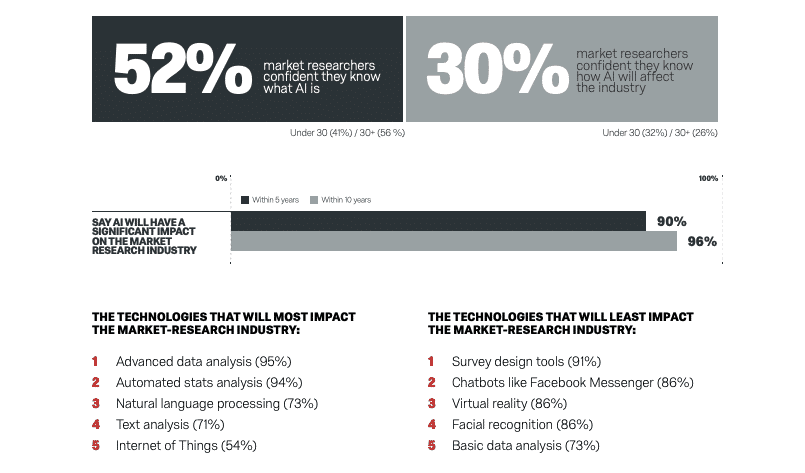
Use of AI grows rapidly across industries
We are now at a point where competitive advantage is increasingly derived from the ability to meticulously capture, analyse and process large volumes of customer data, and effectively use AI/ML to better understand, design and manage customer journeys.
To create impactful experiences, companies need ongoing insights based on a comprehensive, in-depth understanding of their customers. In digitalised, fast-moving markets, there is a need for innovative, agile and semi-automated CX research that combines diverse analytical methods and makes targeted use of AI/ML. Especially on this side of the Atlantic, however, the road ahead is still a rocky one for many.
In a variety of other industries, the use of AI/ML has already grown exponentially. An O'Reilly report from 2021 shows that IT and electronics tops the rankings (17%), followed by financial services (15%), healthcare (9%) and education (8%).
However, the fact that AI/ML still play a relatively small role in market research in no way diminishes the industry's expectations:
According to a survey conducted by Qualtrics this year, a good half of the market research decision-makers surveyed are convinced that they know exactly what AI is; almost all of them assume that AI/ML will have a significant impact on the development of market research over the next ten years; and around 30 per cent are confident that they can adequately anticipate the impact. Trend researchers at the SAP subsidiary specialising in experience management also predict that in five years at the latest, at least 25 percent of all surveys will be conducted using digital assistants.
You want to test Tucan.ai for your Company?
Book a free consultation call!
Advantages for market and CX research
AI/ML tools help companies gain a better understanding of customer behaviour, what problems they have and how they react to certain offers. They make it possible to collect, analyse and interpret data more quickly and accurately.
At the latest since the publication of the language model ChatGPT developed by OpenAI a few weeks ago, computer linguistic methods for Natural Language Processing in particular have been the talk of the town. With NLP, text and speech data can be systematically collected and analysed to find out, for example, how customers behave and react to stimuli. Complex data patterns can then be recognised and interpreted better and better thanks to algorithms.
Long story short: AI/ML offers numerous opportunities to optimise collection and analysis processes. Despite the challenges of developing flexible models that can work with unpredictable language, the usefulness of using AI in market and CX research is unmatched. The following is an overview of the key benefits:
1. Saving resources
Arguably the biggest added value of AI/ML is the time it helps save. Effective automation can reduce the duration of a project from months to weeks or even days. As a result, analysts and marketers can spend more time evaluating, interpreting and telling the story behind the data than calculating generalisable numbers or trying to make sense of relevant wordings. AI/ML also allows companies to redeploy human resources elsewhere and reduce costs for external providers.
2. Higher data quality
There are many challenges that companies and brands face today when it comes to efficient access, use and exploitation of data. According to the latest Dell Digital Transformation Index (2020), data overload and "inability to gain insights from data" are the biggest barriers to successful digital transformation.
Also a major challenge in the area of data analytics are so-called data silos. This refers to data stores that can be accessed little or not at all, e.g. because they are poorly prepared or have been isolated in individual departments.
Although AI/ML are not a miracle cure for such silos, they offer companies tools to gain much deeper insights. Higher quality data usually contributes to much better results. After all, because AI/ML tools generally make it easier to analyse qualitative data by automating collection, processing and linking processes, we can now collect a lot more of it.
In addition, AI systems are now able to identify themes, correlations and subtle nuances in and between individual statements that are often overlooked and passed over in manual documentation. The free-text data obtained enables additional, usually deeper insights.

Use cases in CX research
In the following, I would like to present the most common use cases of AI/ML in customer experience analytics and a few innovative companies leading the way. The most widely used methods and tools include clustering and categorisation algorithms, text and sentiment analysis, and predictive models.
An absolute must-know for every market researcher and CX researcher is definitely Kantar Marketplace, launched in mid-2019. The automated platform, which is available in 70 countries, delivers decision-relevant insights in no time, whether companies need feedback on an idea, are developing a new product or launching a campaign. With Marketplace, Kantar offers an innovative toolbox that enables researchers, professionals and agencies to gain deeper insights through automation and make data-driven decisions faster.
1. Automatic collection
A promising way to drive CX enhancement, friction reduction and cost reduction go hand in hand is automation through so-called bots. In the new year, they are arguably the strongest and most visible trend towards AI/ML in market and customer research.
In response to the Corona pandemic, demand for AI assistants in the industry has skyrocketed. AI/ML-based assistance tools such as those from IBM, Zaoin and boost.ai help CX professionals automate and optimise analytics processes and customer relationships. Virtual agents, for example, pre-select customer queries and automatically answer routine queries. Using scripted rules, AI and ML, they generate automated responses, continuously learn new answers to basic questions through integrations with backend systems, and can handle a much larger volume of queries than humans.
2. Clustering algorithms
Speaking of big data: Most companies already capture a lot of customer interactions in their CRM systems. However, much of this data needs to be properly structured before it can actually provide insights. Using information about customer interactions, AI systems are now being trained to replicate the work of a customer service representative. Leading providers such as Qualtrics use clustering algorithms to do this.
Clustering is a technique that can automatically classify thousands of lines of unstructured conversations. In this way, a company's customer service data can be retrieved for analysis in seconds and successful responses, frequencies, urgencies, etc. can be shown. Deep learning algorithms are used to automatically cluster data and elicit frequently asked customer questions and assess the extent to which support can be automated.
3. Automatic summarisation
AI also comes in handy for summarising videos and audios in CX research. Through the targeted use of NLP, we can now automatically transcribe and summarise gigantic amounts of video and audio feedback. Important information is thus captured more quickly and resources can be focused on more important tasks.
The German software company Tucan.ai, for example, offers AI-generated conversation summaries in addition to automatic recording, transcription and coding. This is particularly useful for those who want to analyse large amounts of data from interviews, group conversations, etc. and save time by not having to document or categorise them manually.
4. Categorisation and coding
The biggest challenge in analysing call data is usually the time and cost associated with manually coding and categorising collected data. Again, Tucan.ai's NLP-based SaaS platform can provide a quick remedy. It is therefore already being used in this country by well-known industry players such as Kantar and GIM.
The Berlin-based deep-tech start-up has developed an in-house AI system that can, among other things, automatically code and categorise conversation data. Large amounts of data are thus processed faster and more precisely, allowing targeted and comprehensive analyses to be carried out and deeper insights into views and customer needs to be gained. This in turn enables key resources to be reallocated, recurring concerns to be responded to more quickly, and products and services to be adapted accordingly.
5. Predictive models
Link AI is an AI platform that predicts the performance of a digital advertisement in the market. It has been trained with Link, the world's largest advertising database, which includes over 230,000 survey-based tests with 30 million real human interactions. Link AI breaks down each ad into individual images and further decomposes the content into images, audio, speech, objects, colours, text as well as other attributes. Then, using AI video processors, the machine extracts up to 20,000 features from the video file, feeds them into machine learning models and finally predicts the score of the ad based on metrics for "creative effectiveness".
AI-driven predictive approaches also become increasingly popular for surveys. For example, SurveyMonkey uses AI-powered tools to help companies design and analyse surveys, predict completion rates and automate data analysis. The tool is widely used for customer and employee surveys, market research and other forms of feedback collection.
6. Audience Journey Tracking
Another area where computer learning is currently on the rise is audience journey mapping. With the help of AI, it’s now possible to precisely document a wide range of customer interactions with a brand or company from start to finish. This way, you can determine more precisely when customers experience friction losses or where exactly they deviate from the interaction process.
Well-known examples of AI-supported audience journey mapping include the web tools HotJar, Appier and Fullstory. They can be used, for example, to specifically observe individual website sessions of those customers who do not complete a purchase. This allows qualitative insights to be gained that are often not properly captured in statistical evaluations of large data sets.
For audience journey tracking, the smart software Knotch is becoming increasingly popular. It can bring together different interactions that customers have with companies over time and show those paths that bring the most conversions. Instead of analysing isolated campaigns that compete with each other for revenue share, Knotch accurately determines exactly how much impact each digital interaction or content had on sales.
7. Automatic sentiment analysis
Sentiment analysis uses AI and ML to determine the emotions expressed in words. It follows a predetermined metric to understand how positive, neutral or negative a statement or text sounds. AI systems can "pre-analyse" millions of comments on social media, rating portals and online surveys.
The innovative use of sentiment analysis outside of commercial market and customer analysis was demonstrated by the AI-powered social media analysis of En Marche in the course of the 2020 Senate elections in France: Emmanuel Macron's party reportedly used NLP and sentiment analysis to gain deep insights into voters' preferences expressed online on certain topics.
In CX research, it comes handy, in particular, for achieving the following goals:
-
Improving marketing campaigns: monitoring sentiments, understanding emotional responses to specific messages and better assessment of competitors' reception.
-
Prioritisation in customer service: prioritise tickets faster, optimise queues through automation, enables faster, more specific responses to feedback
-
Detailed understanding of customers' perceptions of products and brands
-
Trend analysis, forecasting: e.g. reactions to new interfaces or features
-
Churn prediction: e.g. capture negative sentiment online in real time
Sentiment analysis, often called opinion mining in English, is a sub-field of NLP. At its core, it automatically captures and categorises large numbers of individually expressed opinions, transforming unstructured data into actionable information. A real specialist for automated sentiment and emotion analyses, which Qualtrics Marketplace, among others, relies on, is, for example, the British start-up Adoreboard with its "Emotion AI Platform".
From competitive advantage to necessity
Please note that this article does not claim to be exhaustive and merely aims to provide an initial overview of the myriad new players, tools and opportunities that have recently emerged in the CX segment thanks to rapid advances in AI/ML. There are numerous other great applications out there that deserve your attention as well. If you know of any that you would like to bring to our attention, we would of course love to hear from you.
Nevertheless, this article shows very clearly that the targeted use of AI/ML tools is no longer merely a promising competitive advantage, but has become a basic prerequisite for participating in the competition for attention and loyalty. Due to the increasing digitalisation of our society and the ever-growing competition in the online sector, it has become much more difficult to clearly stand out from competitors.
Those who can process large amounts of data, analyse metadata and recognise patterns in a short time gain deeper insights into the thoughts and behaviours of customers. Those companies that do not yet have this capability should start testing innovative solutions as soon as possible. Otherwise, they will inevitably fall behind in the coming years.
You want to test Tucan.ai for your Company?
Book a free consultation call!

